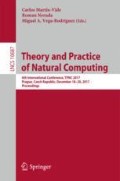Abstract
Fuzzy cognitive map (FCM) is an effective tool for modeling dynamic decision support systems. It describes the analyzed phenomenon in the form of key concepts and causal connections between them. The main aspect of building of the FCM model is concepts selection. It is usually based on the expert knowledge. The aim of this paper is to introduce a new evolutionary algorithm for fuzzy cognitive maps learning. The proposed approach allows to select key concepts based on graph theory metrics and determine the connections between them. A simulation analysis was done with the use of synthetic and real-life data.
Access this chapter
Tax calculation will be finalised at checkout
Purchases are for personal use only
References
Aguilar, J.: Dynamic random fuzzy cognitive maps. Computación y Sistemas 7(4), 260–270 (2004)
Ahmadi, S., Forouzideh, N., Alizadeh, S., Papageorgiou, E.I.: Learning fuzzy cognitive maps using imperialist competitive algorithm. Neural Comput. Appl. 26(6), 1333–1354 (2015)
Borisov, V.V., Kruglov, V.V., Fedulov, A.C.: Fuzzy Models and Networks. Publishing House Telekom, Moscow (2004). (in Russian)
Christoforou, A., Andreou, A.S.: A framework for static and dynamic analysis of multi-layer fuzzy cognitive maps. Neurocomputing 232, 133–145 (2017)
Homenda, W., Jastrzebska, A., Pedrycz, W.: Nodes selection criteria for fuzzy cognitive maps designed to model time series. In: Filev, D., et al. (eds.) Intelligent Systems’2014. AISC, vol. 323, pp. 859–870. Springer, Cham (2015). https://doi.org/10.1007/978-3-319-11310-4_75
Jastriebow, A., Poczęta, K.: Analysis of multi-step algorithms for cognitive maps learning. Bullet. Polish Acad. Sci. Tech. Sci. 62(4), 735–741 (2014)
Kosko, B.: Fuzzy cognitive maps. Int. J. Man Mach. Stud. 24(1), 65–75 (1986)
Kosko, B.: Fuzzy Engineering. Prentice-Hall, Englewood Cliffs (1997)
Kubuś, Ł.: Individually directional evolutionary algorithm for solving global optimization problems - comparative study. IJISA 7(9), 12–19 (2015)
Kubuś, Ł., Poczęta, K., Yastrebov, A.: A new learning approach for fuzzy cognitive maps based on system performance indicators. In: 2016 IEEE International Conference on Fuzzy Systems, Vancouver, Canada, pp. 1398–1404 (2016)
Michalewicz, Z.: Genetic Algorithms + Data Structures = Evolution Programs. Springer, Heidelberg (1996). https://doi.org/10.1007/978-3-662-03315-9
Papageorgiou, E.: A novel approach on constructed dynamic fuzzy cognitive maps using fuzzified decision trees and knowledge-extraction techniques. In: Glykas, M. (ed.) Fuzzy Cognitive Maps: Advances in Theory. Methodologies, Tools and Applications, pp. 43–70. Springer, Heidelberg (2010). https://doi.org/10.1007/978-3-642-03220-2_3
Papageorgiou, E.I., Hatwágner, M.F., Buruzs, A., Kóczy, L.T.: A concept reduction approach for fuzzy cognitive map models in decision making and management. Neurocomputing 232, 16–33 (2017)
Papageorgiou, E.I., Poczeta, K.: A two-stage model for time series prediction based on fuzzy cognitive maps and neural networks. Neurocomputing 232, 113–121 (2017)
Papageorgiou, E.I., Stylios, C.D., Groumpos, P.P.: An integrated two-level hierarchical system for decision making in radiation therapy based on fuzzy cognitive maps. IEEE Trans. Biomed. Eng. 50(12), 1326–1339 (2003)
Papakostas, G.A., Boutalis, Y.S., Koulouriotis, D.E., Mertzios, B.G.: Fuzzy cognitive maps for pattern recognition applications. Int. J. Pattern Recognit. Artif. Intell. 22(8), 1461–1468 (2008)
Poczeta, K., Kubuś, Ł., Yastrebov, A.: concepts selection in fuzzy cognitive map using evolutionary learning algorithm based on graph theory metrics. In: FedCSIS 2017 (2017)
Rickard, J.T., Aisbett, J., Yager, R.R.: A new fuzzy cognitive map structure based on the weighted power mean. IEEE Trans. Fuzzy Syst. 23(6), 2188–2201 (2015)
Salmeron, J.L., Froelich, W.: Dynamic optimization of fuzzy cognitive maps for time series forecasting. Knowl. Based Syst. 105, 29–37 (2016)
Selvin, N.N., Srinivasaraghavan, A.: Dimensionality reduction of inputs for a fuzzy cognitive map for obesity problem. In: 2016 International Conference on Inventive Computation Technologies (ICICT) (2016)
Silov, V.B.: Strategic decision-making in a fuzzy environment. INPRO-RES, Moscow (1995). (in Russian)
Stach, W., Kurgan, L., Pedrycz, W., Reformat, M.: Genetic learning of fuzzy cognitive maps. Fuzzy Sets Syst. 153(3), 371–401 (2005)
Stach, W., Pedrycz, W., Kurgan, L.A.: Learning of fuzzy cognitive maps using density estimate. IEEE Trans. Syst. Man Cybern. Part B 42(3), 900–912 (2012)
Słoń, G.: Application of models of relational fuzzy cognitive maps for prediction of work of complex systems. In: Rutkowski, L., Korytkowski, M., Scherer, R., Tadeusiewicz, R., Zadeh, L.A., Zurada, J.M. (eds.) ICAISC 2014. LNCS (LNAI), vol. 8467, pp. 307–318. Springer, Cham (2014). https://doi.org/10.1007/978-3-319-07173-2_27
Wilson, R.J.: An Introduction to Graph Theory. Pearson Education, Delhi (1970)
Author information
Authors and Affiliations
Corresponding author
Editor information
Editors and Affiliations
Rights and permissions
Copyright information
© 2017 Springer International Publishing AG
About this paper
Cite this paper
Poczeta, K., Kubuś, Ł., Yastrebov, A. (2017). An Evolutionary Algorithm Based on Graph Theory Metrics for Fuzzy Cognitive Maps Learning. In: Martín-Vide, C., Neruda, R., Vega-Rodríguez, M. (eds) Theory and Practice of Natural Computing. TPNC 2017. Lecture Notes in Computer Science(), vol 10687. Springer, Cham. https://doi.org/10.1007/978-3-319-71069-3_11
Download citation
DOI: https://doi.org/10.1007/978-3-319-71069-3_11
Published:
Publisher Name: Springer, Cham
Print ISBN: 978-3-319-71068-6
Online ISBN: 978-3-319-71069-3
eBook Packages: Computer ScienceComputer Science (R0)

